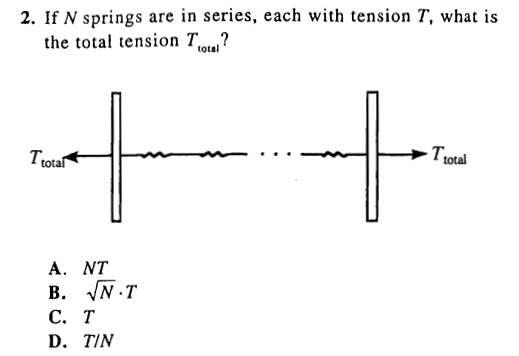I thought springs in series were
ktot = 1/k1 + 1/k2 + ...
this is an interesting problem.
So we know a few facts: when springs connect in series, their x values add. sum of Xs = NX
Also, 1/ktotal = sum of 1/kindividual = N*1/kindividual
Tindividual = x * kindividual
Ttotal = (NX) * (N*1/kindividual)
Ttotal = N * (X*1/kindividual)
Ttotal = N * (X/kindividual)
So Ttotal can not be A.) NTindividual, because Tindividual does not equal (X/kindividual).
I don't think B.) sqrt(N)*Tindividual makes sense because there would be no reason to use squares.
D.) Ttotal =Tindividual/N would be saying that (N * (X/kindividual)) = (kindividual*x)N, when it does not.
That only leaves C.) Ttotal=Tindividual
I think it makes conceptual sense that their tensions would be additive..
I thought about this problem way too much and wrote out an example problem with 2 springs where ki=3 and x=4. I did the math and got the same force of tension for an individual spring as I did for the total force.
Yeah I spent too much time evaluating this one haha
